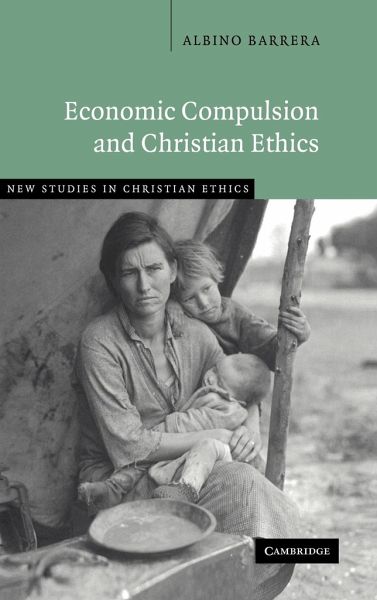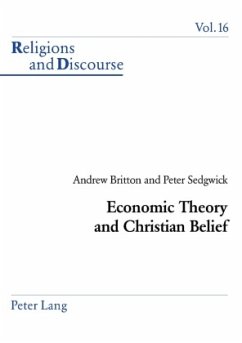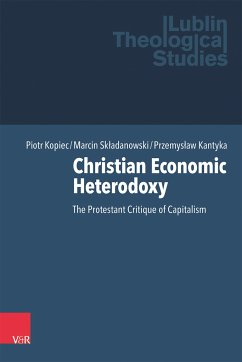
Economic Compulsion and Christian Ethics
Versandkostenfrei!
Versandfertig in 1-2 Wochen
110,99 €
inkl. MwSt.
Weitere Ausgaben:

PAYBACK Punkte
55 °P sammeln!
Barrera addresses adverse effects of market operations on individuals from the viewpoint of Christian ethics.Markets can often be harsh in compelling people to make unpalatable economic choices any reasonable person would not take under normal conditions. Thus workers laid off in mid-career accept lower paid jobs that are beneath their professional experience for want of better alternatives. Economic migrants leave their families and cross borders (legally or illegally) in search of a livelihood and countless Third World families rely on child labor to supplement meagre household incomes. Thes...
Barrera addresses adverse effects of market operations on individuals from the viewpoint of Christian ethics.
Markets can often be harsh in compelling people to make unpalatable economic choices any reasonable person would not take under normal conditions. Thus workers laid off in mid-career accept lower paid jobs that are beneath their professional experience for want of better alternatives. Economic migrants leave their families and cross borders (legally or illegally) in search of a livelihood and countless Third World families rely on child labor to supplement meagre household incomes. These are examples of economic compulsion, an all-too-frequent state of affairs in which people are driven to make choices under acute economic duress. These economic ripple effects of market operations have been virtually ignored in ethical discourse because they are generally accepted to be the very mechanisms that shape the market's much-touted allocative efficiency. Albino Barrera argues that Christian thought on economic security offers an effective framework within which to address the consequences of economic compulsion.
Table of content:
General editor's preface; Preface; Part I. The Nature and Dynamics of Economic Compulsion: 1. Markets and coercive pecuniary externalities; 2. The regressive incidence of unintended burdens; Part II. Setting the Moral Baseline and Shaping Expectations: 3. Economic security as God's twofold gift; 4. Retrieving the biblical principle of restoration; Part III. Contemporary Appropriation: 5. Economic rights-obligations as diagnostic framework; 6. Application: the case of agricultural protectionism; 7. Summary and conclusions; References; Index.
Markets can often be harsh in compelling people to make unpalatable economic choices any reasonable person would not take under normal conditions. Thus workers laid off in mid-career accept lower paid jobs that are beneath their professional experience for want of better alternatives. Economic migrants leave their families and cross borders (legally or illegally) in search of a livelihood and countless Third World families rely on child labor to supplement meagre household incomes. These are examples of economic compulsion, an all-too-frequent state of affairs in which people are driven to make choices under acute economic duress. These economic ripple effects of market operations have been virtually ignored in ethical discourse because they are generally accepted to be the very mechanisms that shape the market's much-touted allocative efficiency. Albino Barrera argues that Christian thought on economic security offers an effective framework within which to address the consequences of economic compulsion.
Table of content:
General editor's preface; Preface; Part I. The Nature and Dynamics of Economic Compulsion: 1. Markets and coercive pecuniary externalities; 2. The regressive incidence of unintended burdens; Part II. Setting the Moral Baseline and Shaping Expectations: 3. Economic security as God's twofold gift; 4. Retrieving the biblical principle of restoration; Part III. Contemporary Appropriation: 5. Economic rights-obligations as diagnostic framework; 6. Application: the case of agricultural protectionism; 7. Summary and conclusions; References; Index.














